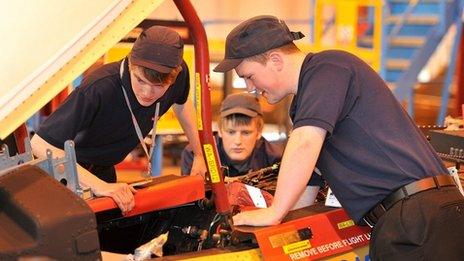Teenagers need 'face-to-face' careers advice
- Published

There are warnings that youngsters lack an understanding of the jobs market
Face-to-face information is needed as part of a major upgrade in careers advice for young people in England, says the National Careers Council.
The council, which advises the government, says that fewer than 1% of teenagers have used a phone line set up to offer them careers advice.
There are worries that pupils lack an understanding of the jobs market.
Council chairwoman Deirdre Hughes says there needs to be a "culture change" in providing careers advice.
A report from the National Careers Council warns of a disconnect between young people and the world of work, with high levels of youth unemployment reported at a time when employers say they have difficulty recruiting suitably qualified staff.
"It is clear that there is a mismatch between the career aspirations of young people and the reality of the jobs market," says Dr Hughes.
Skills Minister Matthew Hancock says the report sets out an "ambitious new path for how careers guidance needs to progress".
Social mobility
The report, calling for improvements in careers information, says there are more than a million young people who are not in education, employment or training while the CBI says half of firms have problems finding staff.
"It's clear that business, the education system and government must raise their game," said Sir Roger Carr, the CBI's president.
"Young people need the skills that employers demand - we cannot afford to waste talent when the long-term economic outlook is so challenging."
There are also concerns that a lack of accessible careers information is a significant barrier to social mobility, with advice much more widely available to wealthy, well-connected youngsters.
"This is particularly important for the two million young people who live in workless homes and often don't have the 'soft networks' - contacts via family and friends to the world of work," says the report, An Aspirational Nation.
The report wants an expansion of the National Careers Service, set up last year. And it calls for face-to-face advice to be available for all pupils from the age of 12, rather than providing advice via a phone line or website.
The careers service is described in the report as a "well-kept secret", with many youngsters not aware of the help available.
There were 34,000 phone calls received by the helpline service in the year to March 2013 and similar numbers of emails, web chats and texts, from an age group of more than four million youngsters.
Face-to-face advice from the National Careers Service is not available to young people and is only offered to adults.
Career paths
Malcolm Trobe, deputy general secretary of the ASCL head teachers' union, said that for younger teenagers it was a "big ask to pick up the phone to a stranger and say that you don't know what you want to do with your life".
"In a face-to-face conversation with someone you know and trust, it's much easier to draw things out, to explore different career paths and to see how it's possible to channel your interests and skills into a job."
The ASCL leader, Brian Lightman, said there should be guaranteed "access to high quality careers provision to all young people regardless of where they live or where they go to school".
Susan Burke, head of careers at a secondary school on Merseyside, said that the practical problem can often be that without good personal advice young people don't know how to begin finding out about the range of jobs available.
Too often students' understanding of work will be limited to a narrow range of jobs that they have come across in their own lives.
Even the terminology of certain types of work will be confusing, she says.
"How are students meant to know where to look?"
Responsibility for careers advice has been handed to individual schools - a decision which was criticised by a report from MPs on the education select committee earlier this year.
The cross-party report warned that careers services showed a "worrying deterioration" and called for urgent improvements.
Ms Burke says that schools trying to save money might put careers staff on to part-time contracts, working against the idea of giving careers advice a higher status.
Nick Chambers, director of the Education and Employers Taskforce charity and an associate member of the National Careers Council says: "As a country we are doing our young people a huge disservice if we don't give them enough information to allow them to make informed decision about their futures.
"Far too many young people are having to make vital and incredibly important decisions about their futures without access to good and reliable information."
Tristram Hunt, shadow minister for young people, said: "Michael Gove and David Cameron are pulling up the ladder of opportunity after them. With almost a million young people unemployed, undermining careers advice is short-sighted and incredibly self-defeating."
Skills Minister Matthew Hancock said: "Last year we created the National Careers Service to provide professional advice; and give schools and further education colleges a powerful new responsibility to secure independent careers guidance for their students.
"This report sets out an ambitious new path for how careers guidance needs to progress - to inspire, motivate and inform - and I look forward to working with the National Careers Council to consider the detail of their recommendations."
- Published19 March 2013

- Published23 January 2013

- Published23 November 2012
